How to book for life in UK test?
Link : https://www.gov.uk/life-in-the-uk-test
Time for exam: 45mins
Questions: 24
Need to score 18 (75%)
How much time need to study?
You can go to the textbook and then go to note then goes to questionbank ( 1 week to 1 month).
Otherwise, I recommend intensive study for 3 days (notes and then go to qustionbank, especially exam 1-17).
Questions bank use : https://lifeintheuktestweb.co.uk/
Note
In colour, it is for Exam 1 -17
In bold, it is from test/chapter
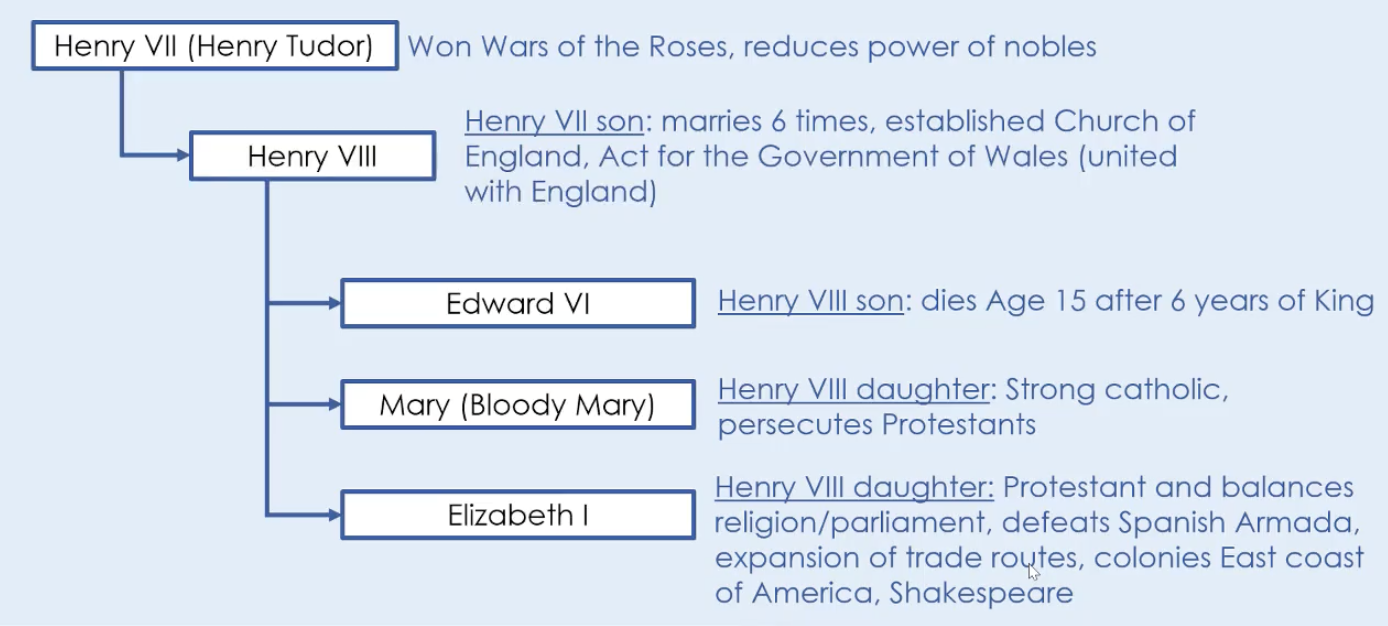
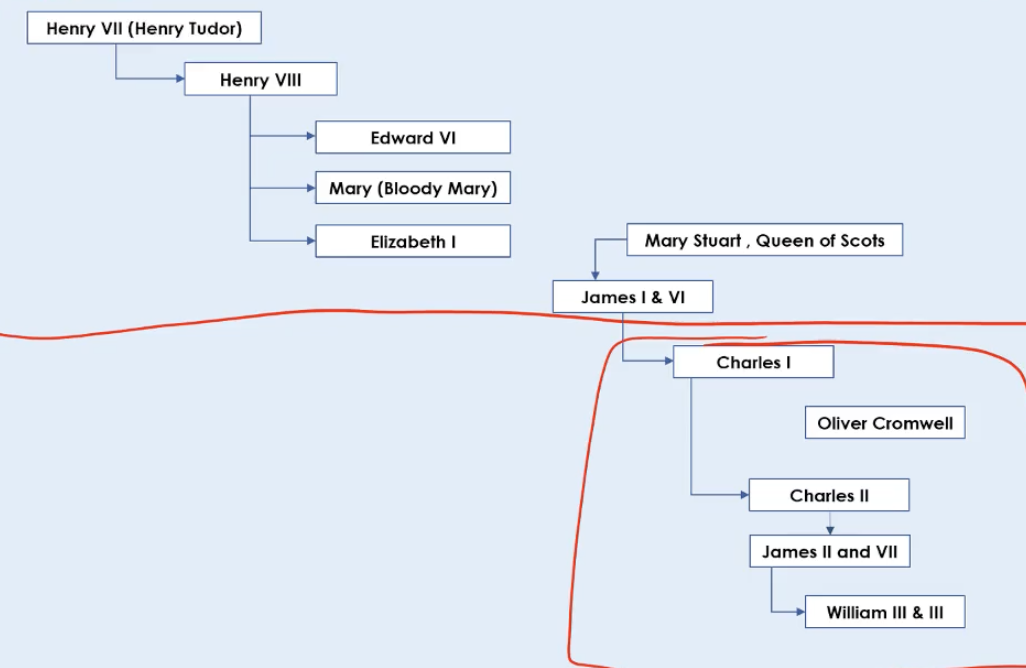
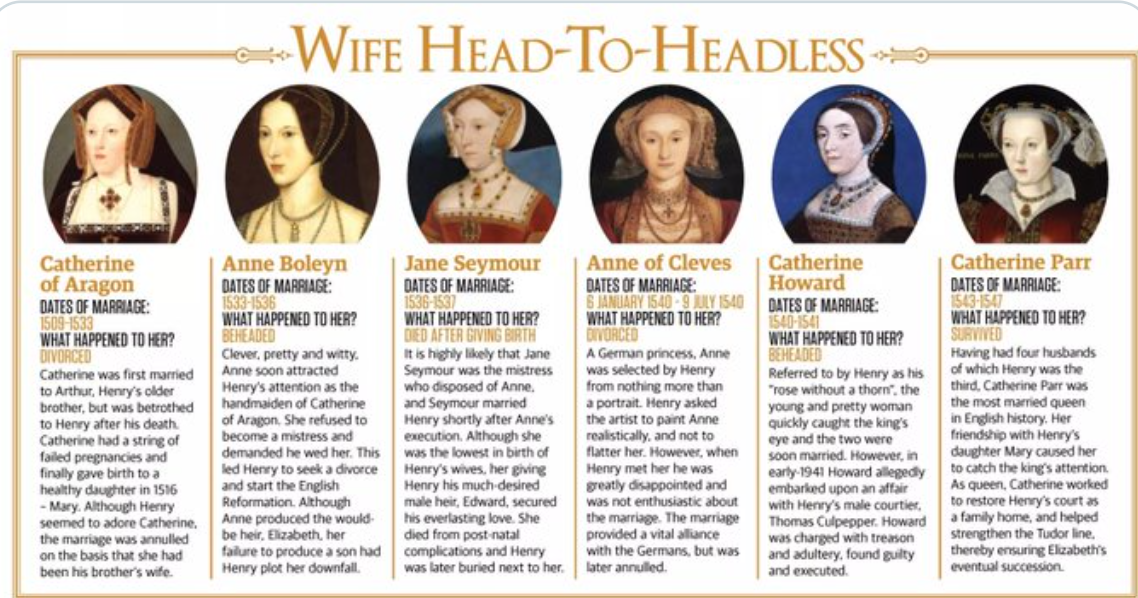
King Alfred the Great
Henry VIII
king of England from 21 April 1509, until his death on 28 January 1547
British throne after Henry VIII : Edward VI, his son- died at age of 15 years
Henry VIII established the Church of England because the Pope didn’t let him divorce his first wife, Catherine of Aragon.
The Reformation - the name of the movement against the authority of Pope and ideas of the Catholic Church took place during the reign of VIII
took the title of ‘King of Ireland’, English laws were introduced and local leaders were expected to follow the instructions of the Lord Lieutenants in Dublin
Protestant | Catholic |
Elizabeth, William of Orange | Mary Stuart |
Puritans | James VI |
Plantations settlements of Scottish and English Protestants in Ulster (the northern province of Ireland) during the reigns of Elizabeth I and James I, who took over the land from Catholic landholders
|
|
1680-1720 | Refugees called Huguenots came to England from France |
Mary Stuart, often called Mary, Queen of Scotland
Spend most of her childhood in France
Catholic (x protestant)
Gave her throne to Protestant son, James VI of Scotland
She was kept in prisoner for 20 years, then be executed accused of plotting against Elizabeth I
Elizabeth I
-Protestant (false- a catholic)
- Father : Henry VIII
-mother of Elizabeth I - Anne Boleyn
- English settlers first began to colonize the eastern coast of America
- was a Protestant and she succeeded in finding a balance between the views of Catholics and the more extreme Protestants.
- become one of the most popular monarchs in English history, particularly after 1588 when the English defeated Spanish Armada (a large ship), which had been set by Spain to conquer England and restore Catholicism
William I |
| Domesday Book & Bayuex Tapestry give us information about England during the reign of William I |
Edward VI |
| Died age 15 years |
Mary (half-sister of Edward VI) |
|
|
Elizabeth I | William Shakespeare |
|
James VI- of Scotland became King James I of England, Wales and Ireland |
| Scotland remain a separate country |
| Emperor Hadrian | -built a wall in the north of England to keep out the Picts (ancestors of the Scottish People) forts of Housesteads and Vindolanda |
| Crown Jewels | kept in the Tower of London |
| Charles II resigns | a great fire (1666)destroyed much of the city, including many churches and St Paul’s Cathedral |
| King James resign | translate the bible into English the translation is known as the ‘King James Version’ or the ‘Authorised Version’ |
1649 | Charles I -believe in the Divine Rights of Kings -he tried to rule without the Parliament | execute -> England ruled by a republic and not by a monarch -> declare as republic/ CommonWealth |
1688 | William of Orange (from Netherlands) asked by Protestants to invade England. James escaped to France. | The ‘Glorious Revolution’ -there was no resistance and he took the throne |
1714 | Queen Anne died and George I (Anne’s nearest Protestant relative) became the next king |
|
| The MacDonalds of Glencoe | Scottish clan was killed for not taking Oat |
1837 | Victoria become queen | at the age of 18 |

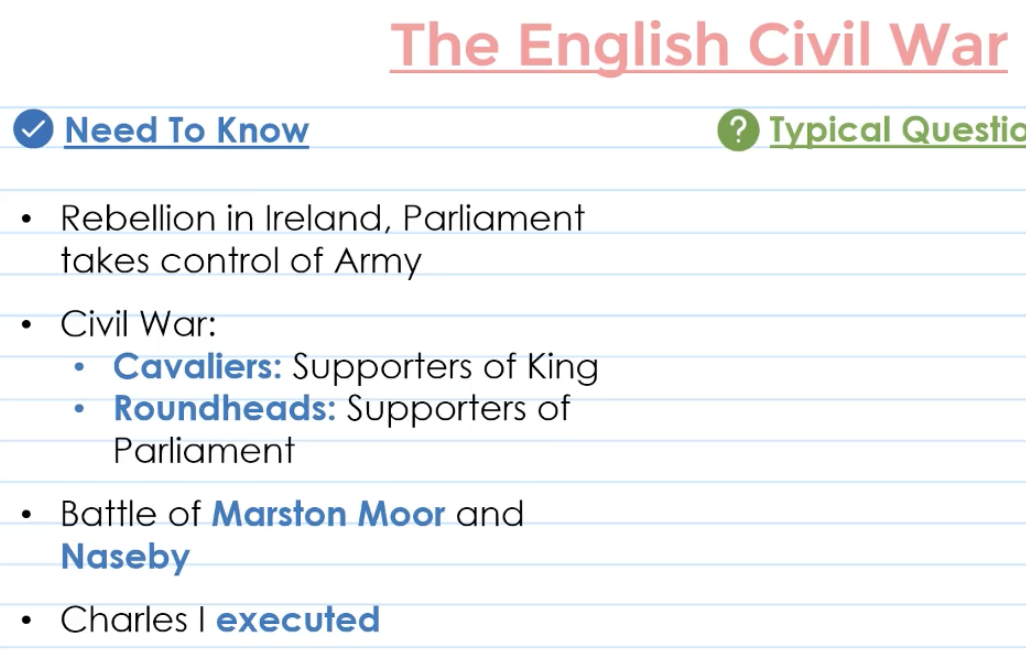
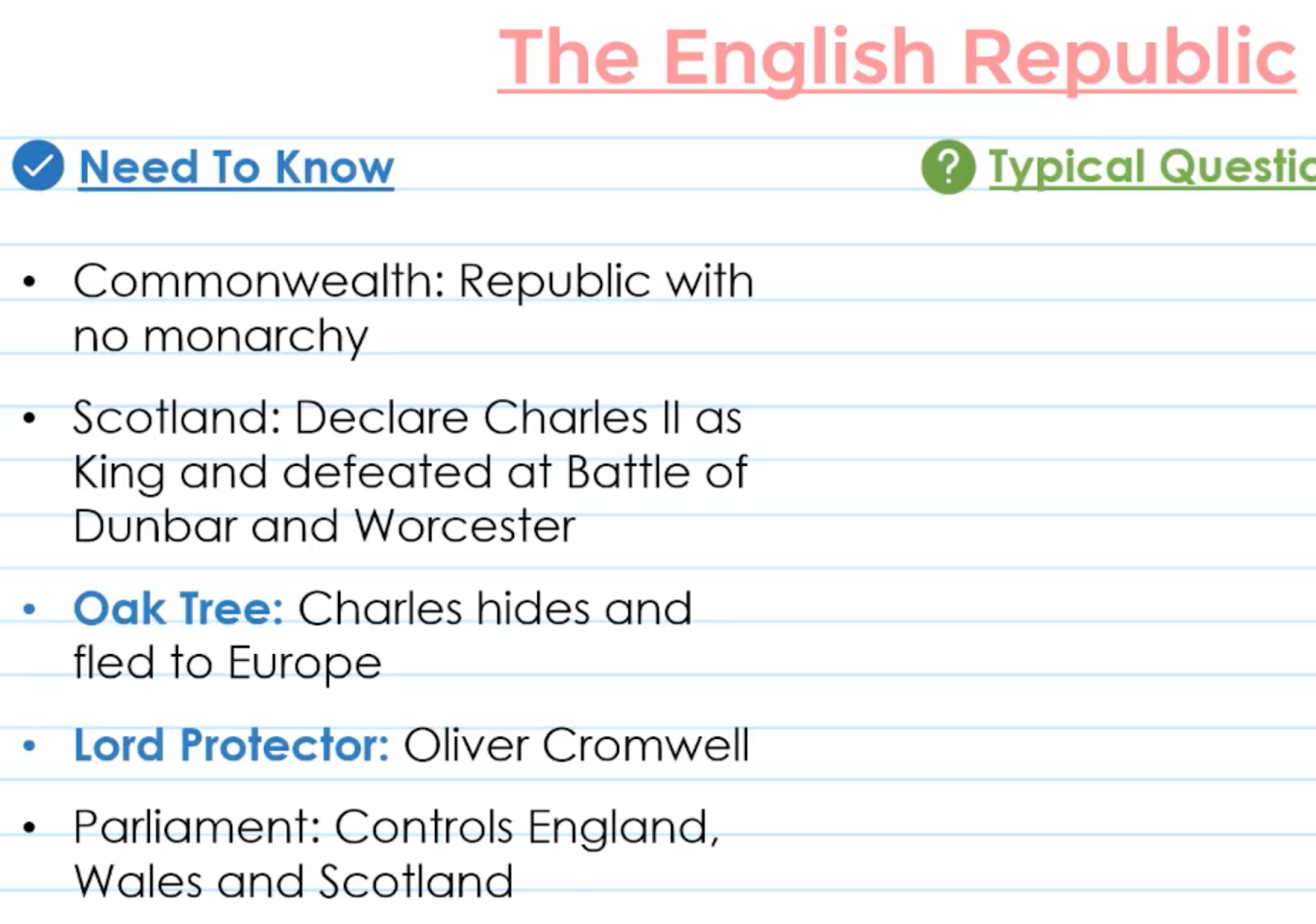
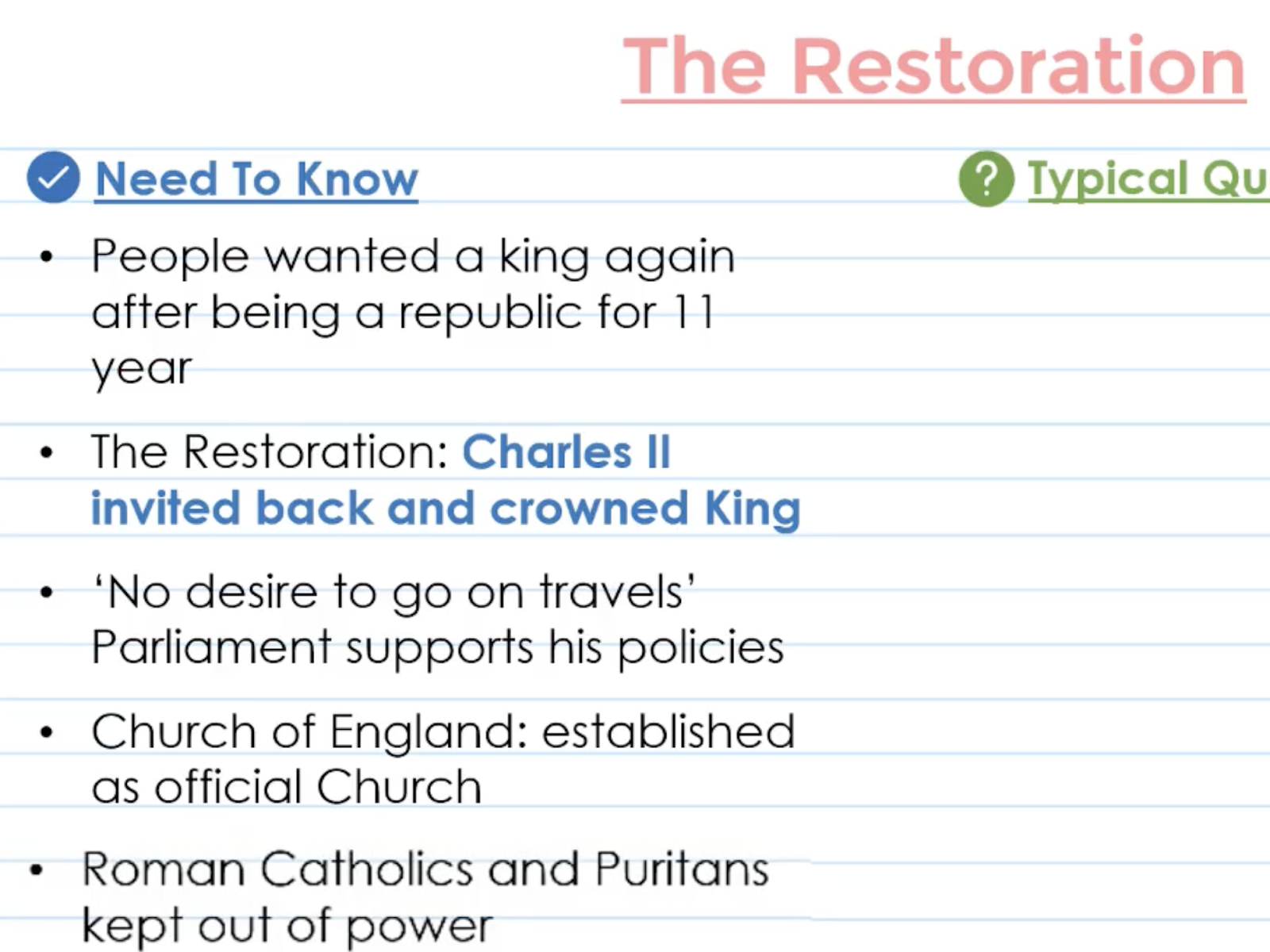
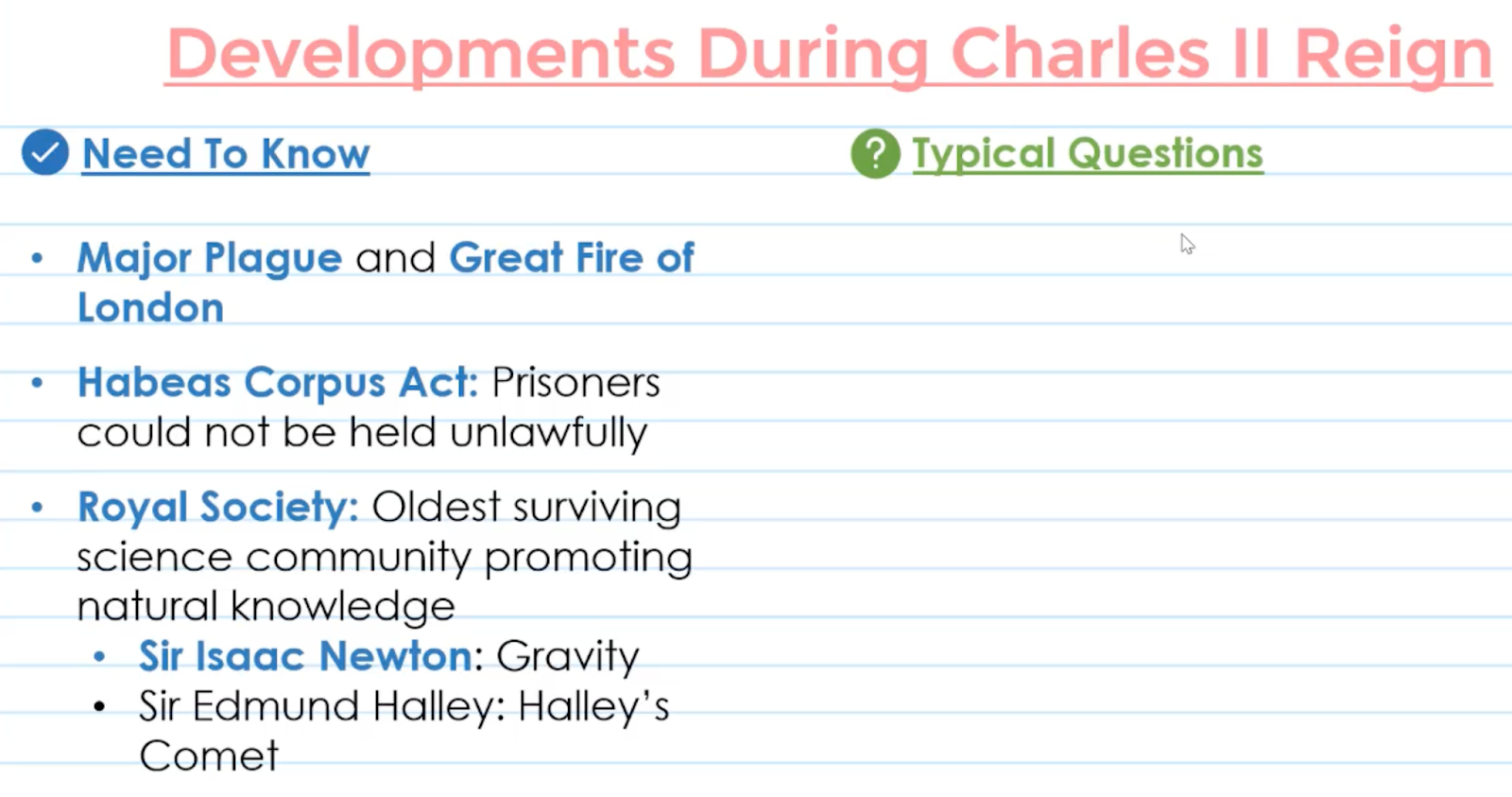
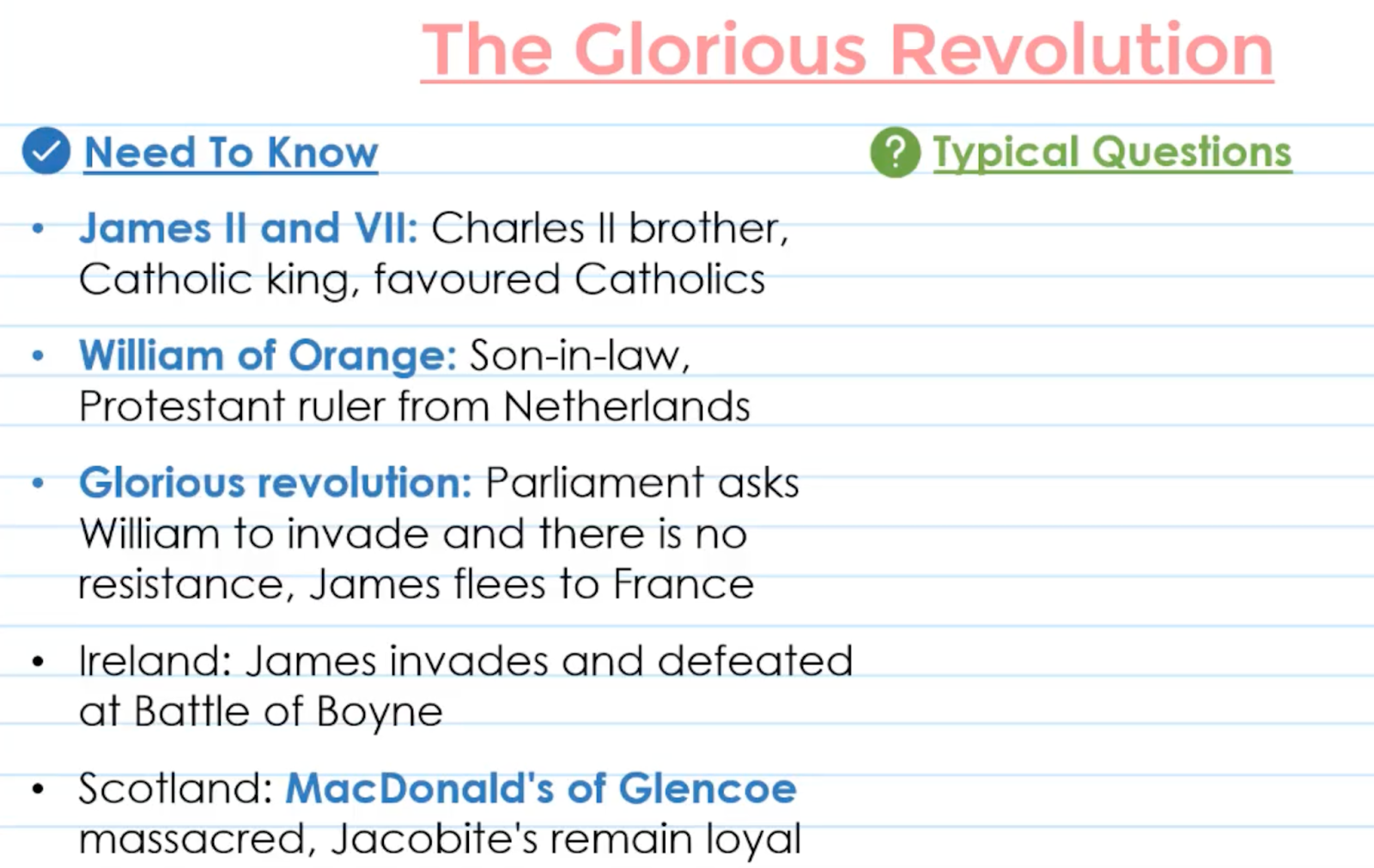
Battle/ War
1066 | Battle of Hastings | is commemorated in great piece of embroidery: Bayeux tapestry, seen in France today The Norman Conquest was the last successful foreign invasion in England William, duke of Normandy from France (william the conqueror) He defeated King Harold at battles of hasting in 1066 |
1314 | Battle of Bannockburn (Scottish) | Scottish lead by Robert the Bruce (Scottih King)defeated English therefore, Scotland reamins unconquered by the English |
1690 July | Battle of Boyne (Ireland) | celebrated in Northen Ireland, in July (public holiday) James II was defeated by William of Orange |
1815 | Battle of Waterloo (France) | French Wars ended with defeats of the Emperor Napoleon by Duke of Wellington Last battle Britain and France |
| Battle of Trafalgar (Spanish) | Admiral Nelson in charge of British Fleet ad was killed in the battle ship - HMS Victory, can be visited in Portsmouth British Officer in charge of British Fleet at the Battle of Trafalgar against the Spanish fleet
|
1853-1856 | Crimean War (Russia) | Britain, turkey & frence fight against Russia -first war to be extensively covered by the media through news stories and photographs |
1899 to 1902 | Boer War | took place in South Africa settlers from Netherlands called Boer. The Boers flights fierecely and the war went on for over 3 years. |
| Civil War Battles
| The Battle of Marston Moor The Battle of Naseby Charles I executed |
1940 summer | ‘The Battle of Britain’ The Blitz(Germany) | the crucial aerial battle fought between Germany and Britain Royal Air Force |
Hundred Years War
World war 1 (1914 to 1948, 4 years)
Bulgaria is not part of the Allied power during first world war ( Bulgaria is part of the central powers)
On 28 June 1914, Archduke Franz Ferdinand of Austria was assassinated. Leading to World War I.
Allied Power : France, Japan, Serbia
End on 11am, 11th November 1918
60 000 British casualties on the first day alone, in one battle attack of Summer in July 1916
1918, women over the age of 30 were giving voting rights and right to stand for Parliament, partly in recognition of the contribution women made to the war effort during the First World War.
World War II (1939-1945, 6 years)
The Blitz- relates to German air force bombing London and other British cities at night time during the ‘ Battle of Britain’ in the summer of 1940
Although the UK had won the war, the country was exhausted economically after WWII.
Winston Churchill - inspiration leader durig WWII
In which we serve - movies played to boost morale during WWII
1939, Hilter invaded Poland - result Britain and France declare war to stop his aggression.
‘The Battle of Britain’ WWII : (summer 1940) crucial aerial battle fought between Germany and Britain
Dunkirk Spirit - the evacuation of Allied soldiers from France during World War II (huge naval operation). Many civilian volunteers in small pleasure fishing boats from Britain helped the Navy to rescue more than 300,000 men from the beaches around Dunkirk.
United Nations (UN) set up after Second World War and aims to prevent war and promote international peace and security.
Remembrance Day at 11am, there are two-minutes silence, and wreaths are laid at the Cenotaph a war memorial) in Whitehall, London
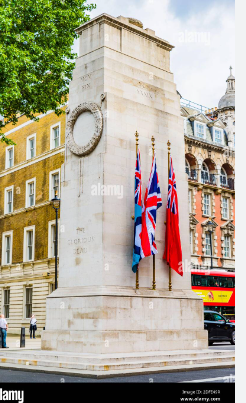
Terminology
Fundamental of British Life | tolerance of those different faiths and beliefs, the rule of law, faiths and beliefs, democracy, individual liberty and participants in community life
X monarchy, x join a political party |
Permanent resident/ citizen of the UK | -respect and obey the law -look after yourself and your family -respects the rights of others (including their own opinions) -treat others with fairness -look after the area in which you live and the environment |
Driving in UK | Need a valid driving license |
Document require to apply for National Insurance Number | Documents that prove that you have permission to work in the UK Documents that prove your identity
|
National Insurance Number | To apply need to contact Department for Work and Pensions (DWP) |
Coalition | no political party wins a majority, two parties may join and govern together |
Monarch responsibilities | To appoint government To advise, warn, and encourage PM decisions on government policies |
Canvassing | persuading people to vote for a political party -for instance: by handing out leaflets in the street or by knocking on people’s doors ad asking for their support |
Debates | The public can listen to debates in the Palace of Westminster from public galleries in both the House of Commons and the House of Lords. (true) |
Stands for public office | Most citizens of UK, Ireland or the commonwealth aged 18 or over exceptions, including members of the armed forces, civil servants, people found guilty of certain criminal offenses |
Civil Servants | are chosen on merit and are politically neutral - they are not political appointees |
Location of UK | North West of Europe |
NO written constitution | British constitution is not written down in any single document therefore it is described as unwritten. |
Constitutional institutions in UK | Includes (x armed force) |
UK Parliament | 2 houses House of Commons House of Lords ( peers) - are not elected by the people |
The Speaker | -chairs the debates in the House of Commons -is an neutral MP, he or she represents a constituency and deals with the constituents (true) |
Poll card | Before the election, you will be sent a poll card |
General Election | MPS are elected at the General Election which is held at least every 5 years. Welsh government - every 4 year |
Contact MPS | can be by letter or telephone at their constituency office, or at their office in the House of Commons |
Local ‘surgeries’ MP | local ‘surgeries’ where constituents can go in person to talk about issues that are of concern to them |
By-election | If an MP dies or resigns, there will be a fresh election, called a by-election, in his or her constituency. |
Constituency | The responsibility of the MPs is to represent everyone in their constituency. |
Solicitor charges | based on how much time they spend in a case |
Tv and Radio | by law, coverage of the political parties must be balanced and so equal time has to be given to rival viewpoint |
BBC (1936) | the largest broadcaster in the world only wholly state-funded media organization that is independent of government |
Complaint about police | Anyone can make a complaint about the police by writing to the Chief Constable of the police force involved. (True) - either by going to police station or writing to can also be independent body
England/ Wales: the Independent Police Complaints Commission Scotland: Police Complaints Commissioner Northen Ireland : Police Ombudsman |
Key roles of School governor | 3key roles setting the strategic direction of the school ensuring accountability monitoring and evaluating school performance
|
American colonies | what led americian colonies to want their independence from Britain? |
Huguenots | between 1680 to 1720, many refugees called Huguenots came from France |
The Highland Clearances | a process began which Scottish landlords destroyed individual small farms (known as ‘crofts’ to make space for large flocks of sheep and cattle. |
Feudalism | the Normans used a system of land ownership known as feudalism |
Allotment | people rent additional land, for grow fruit and vegetables |
Suffragettes | group who used civil disobedience to gain the vote from women in late 19th and early 20 centuries: campaigned and demonstrated for greater rights and in particular, the right to vote leader: Emmeline Pankhurst
|
Serfs | peasants who had a small area of their lord’s agricultural land where they could grow food (middle age) |
Fenians | irish people who favored independence from Uk in 19th century |
Potato | In the middle of the century, the potato crop failed, and Ireland suffered a famine. A million people died from disease and starvation. |
Chartist campaign | Right to vote for the working class |
The Reformation | name of the movement against the authroty of Pope and ideas of Catholic Church took place during reign of VIII |
Glorious Revolution | the law passed after the Glorious Revolution marked the beginning of constitutional monarchy |
The Enlightenment | a period of new idea about politics, physiology and science 18the century David Hume (famous philosopher who developed the idea) |
Pre-Raphaelities | important group of artists in the second half of 19th century painted details of religious or literary themes in bright colors the group includes : Holman Hunt, Dante Gabriel Rossetti, Sir John Millais
|
Role of Monarch | -appoints government, which people chosen in a democratic election -regular meetings with the Prime Minster and can advice, warn and encourage, but the decisions on government policies are made by PM and cabinet
x appoint cabinet |
Role of MPs | to represent everyone in their constituency to help to create new laws to scrutinize and comment on what the government is doing to debate important national issues |
House of lords-peers | are not elected by people |
Shadow Cabinet | the leader of the opposition appoints senior opposition MPS to be shadow ministers. their role is to challenge the government and put forward alternative policies. |
Great Britain | refers only to England, Wales and Scotland ( x NI) |
Dunkirk spirit | the evacuation of Allied soldiers from France during World War II (a huge naval operation). Many civilian volunteers in small pleasure fishing boats from Britain helped the Navy to rescue more than 300,000 men from the beaches around Dunkirk. |
Hansard | proceedings in Parliament are broadcast on television and published in official reports called Hansard |
Auld Lang Syne Song | sung by people in Uk and other countries when they are celebrating New year (or Hogmanay) |
Hadrian’s wall | forts of Housesteads and Vindolanda |
f/ Religion
Charles I wanted to worship of the Church of England to include more ceremonies and introduced a revised Prayer Book
The Church of England - official church of state, called Anglican Church in other countries and the Episcopal Church in Scotland & US
In 1560, predominant Protestant Scottish Parliament abolished the authority of the Pope in Scotland and Roman Catholic religious service became illegal. A protestant church of Scotland was an elected leadership was established but, unlike in England, this was not a state church.
In Scotland, the national church is the Church of Scotland, which is a Presbyterian Church
There is no establisehd Church in Wales or Northen Ireland.
Several Church of England bishops sit in the House of Lords. (true)
Head of the Church of England : the monarch
Spiritual leader of church of England: the Archbishop of Canterbury
Divine Right of Kings
Eden Project
giant greenhouses, house plants from all over the world
located in Cornwall, in the south west of England
charity which run environmental and social projects internationally
Pantomimes
British tradition that many theaters produce during Christmas
based on fairy stories
light-hearted plays with music and comedy, enjoyed by family and audicence
traditional character of pantomimes : the Dame (women played by a man)
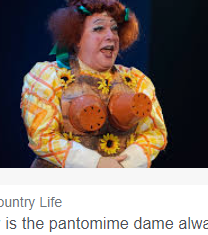
Important events
EARLY BRITIAN |
|
Stone age 10,000years ago | Hunter-gatherers- First people to live in Britain Land bridge- Britain only became permanently separate from the continent by Channels |
|
BC 6000 years ago | the first farmer arrives in Britain, ancestors came from south-east Europe Stonehenge in wiltshire, skara brae on orkney, off nort coast scotland |
Bronze age 4000 years ago | lives in roundhouses, burry in round barrows |
Iron age | made first coins- the names of iron age kings marks the beginnings of British history Hill fort- maiden castle in the English Country of Dorset celtic language |
55BC | Julius Caeser - first person to lead a Roman invasion in Britain This was unsuccessful and for nearly 100 years Britain remained separate from Roman Empire |
3rd and 4th Centuries AD | Christian communities began to appear In British St Augustine from Rome- 1st archbishop of canterbury |
AD43 | Emperor Claudius led the Roman army in a new invasion. This time, there was resistance from some of the British tribes but the Romans were successful in occupying almost all Britain. Rebellion-Boudicca Emperor Hadrain builds walls to keep out picts Forts: housesteads & Vindolanda Built roads, public building, creat law, new plants & animals Left AD 410 after 400 years |
AD 410 | Britain was invaded by tribes from northern Europe: the Jutes, the Angles and the Saxons. Jutes from northern europe- The Anglo-saxons- kingdom establish Sutton Hoo- King buried with treasure/armour in ship under mound of earth Christian missionaries- arrive in 3/4th centuries to preach- St Patrick, St Columba from Ireland, St Augustine from Rome- 1st archbishop of canterbury |
AD 789 | Vikings came from Denmark, Sweden and Norway -Vikings first visited Britain to raid coastal twins and take away goods and slaves - Anglo-saxons united under king Alfred the great & defeat vikings Scotland united under Kenneth MacAlpin Short rule by danish King- Cnute (Canute) |
1066 | The Norman Conquest was the last successful foreign invasion in England William, duke of Normandy from France (william the conqueror) He defeated King Harold at battles of hasting in 1066 Bayeux Tapestry- depicts battle in France Domesday Book- William send people over England to draw list people names, land & animals owned |
| Domesday Book & Bayuex Tapestry |
Middle age |
|
1200 | English rules an area of Ireland known as Pale, around Dublin. (False- Englished ruled an area of Scoltand known as Pale around Edinburgh) |
1284 | Wales- King Edward I Statue of Rhuddlan - to annex Wales to the Crown of England |
1215 | Magna Carta was created (to restrict the King Power) King John accepted the charter to limit power House of lords- Lords, bishops, great landowners House of commons- knights, small landowner, wealthy people from towns Scotland- lords, common and clergy England- common law (precedence) Scotland: codified (written down) |
|
1314 | Scotland- Robert the Bunce defeat English at battle of Bannockbourn therefore, Scotland remained unconquered by the English |
1348 (Middle Age) | Black Death -plague, one third of population of England/scotland/wales died -worst disasters over strike Britain -smaller population meats there awas less need to grow cereal crops -labour storages and peasants (serfs) began to demand higher wages
Serfs- peasants who had a small area of their lord’s agricultural land where they could grow food
Gentry - new social clases, owners of large area of land people left countryside to live in town in town, growing wealth led to developmet of strong middle class |
1400 | English written by Anglo-Saxon & Norman French Gaelic by scottish people Canterbury tales- poem about Pilgrimage by Geoffrey Chaucer printed by William Caxton The burce- poem about Battle of bannockburn by John Barbour |
1415 Crusades 100 years war abroad | many knights took part (religious wars), in which European Christians fought for control of the Holy Land King Henry V at battle of Agincourt |
1455 | civil war- Wars of Roses- centralises power & reduce power of nobles Henry Tudor- House of Lancaster (red roses)- victory at battle of Bosworth King Richard III- House of York (white rose) |
1485 | -the medieval period/ middle ages, period after Normal Consequest |
|
15th Century | manufacturing jobs became the main source of employment in Britain |
15th century | golf can be traced back, scotland St Andrew in Scotland (home of golf) |
1588 | English defeated the Spanish Armada |
|
May 1600 | Parliament invited Charles II to come back from exile in the Netherlands. He was crowded King Charles II of England, Wales, Scotland and Ireland. |
1605 | Guy Fawkes -led the group of Catholics who tried to kill the Protestant king with bomb in Houses of Parliments - failed -5th November: origin the Bonfire Night celebration, where the British set off fireworks at home or in special displays |
1642 | began of civil war betwen the king (King Charles I) and Parliment support King : Cavaliers support Parliament : The Roundheads |
1649 | Charles I King was executed (defeated in Battles of Martson and Naseby)
-> England rules by a republic and not by a monarch -> declared as republic/ CommonWealth |
1666 | Great fire -destroyed many churches including St Paul’s Cathedral- rebuilt by Sir Christoper Wren |
Btw 1680to 1720 | many refugees called Huguenots (protestant refugee) came from France |
1688 | William of Orange, asked by Protestants to invade England The Glorious Revolution -there was no resistance and he took the throne |
1689 | The Bills of Right -confirmed the right of Parliament and the limits of kings’ power |
1690 | William of Orange defected James II at the Battle of Boyne in Ireland |
|
1745 | -there was another attempt to put a Stuart king back on the throne in place of George I’s son. Bonnie Prince Charlie (Charlie Edward Stuart) -grandson of James II, landed in Scotland - supported by clansmen from Scottish highlands and raised the army |
1776 | 13 Northen American colonies declared their independence, stating that people had a right to establish their own governments |
|
18 century | trading and settlements oversea sometimes brought Britain into conflict with other countries (France)- similar way |
18th century | Adam Smith The Enlightenment - new idea about politics, physiology and science. economics |
1801 | Ireland unified with England, Scotland, Wales after Act of Union 1800 -creating the United Kingdom of Great Britain and Ireland |
1815 | Battle of Waterloo. Last battle Britain and France |
1833 | Emancipation Act: Abolished slavery throughout the British Empire |
1851 | Great Exhibition of 1851 Hyde Park - The Crystal Palace |
1853-1856 | Crimean war Britain, Turkey & France against Russia |
1895 | The National Trust founded |
1896 | films first shown publicly in UK |
1899-1902 | Boer War, in South Africa |
18th and 19 century | steam power (James Watt) |
|
19th century | Medieval Gothic style -become popular architecture style -e.g. Houses of Parliments and St Pancreas Stations, town halls in Manchester and Sheffied |
19th century | Rugby originate in England Super League- is the most famous well-known rugby league club competition 2 different types : Union and League |
Late 19th century | modern Tennis evolved |
1902 | motor-car racing in the UK started British continue to be world leader int the developing and manufacture of motor-sport technology (true) |
1918 | WWI end |
1918 | women over the age of 30 were giving voting rights and right to stand for Parliament, partly recognition of the contribution women made to the war effort during the First World war. |
1913 | British government promised ‘Home Rule’ for Ireland was delayed until 1921, due to outbreak of First World War |
1914-1918 | First World War On 28 June 1914, Archduke Franz Ferdinand of Austria was assassinated |
1922 | Ireland divided into two countries 1921- peace treaty was signed |
1928 | women are given the right to vote at age of 21, same as men |
1930 | Britsh Film studio flourish |
1930s | Great Depression shipbuilding (traditional heavy industries) were badly affeted |
1936 | BBC is the first regular television service in world |
1939 | Germany invaded Poland Hilter invaded Poland - result Britain and France declare war to stop his aggression. World War II |
1940 summer | ‘The Battle of Britain’ WWII - use the Royal Air Force crucial aerial battle fought between Germany and Britain |
1948 | National Health System (NHS) |
1949 | Ireland become a republic |
1960 | Swinging Sixties social changes: the position of women in the workplace was improved growth of British fashion, cinema & popular music
|
in 1960s | pop music groups popular |
1966 | English football team won the World Cup (Bobby Moore - captain) |
in late 19th and early 20 centuries | Suffragettes group who used civil disobedience to gain the vote from women in late 19th and early 20 centuries: campaigned and demonstrated for greater rights and in particular, right to vote leader: Emmeline Pankhurst |
|
20 century | Harrier Jump set |
2009 | British combat left Iraq |
2010 | In May 2010, first time in UK since February 1974 - no political party won on overall majority in the General Election. The Conservative and Liberal Democrat parties formed coalition and the leader of the Conservative Party, David Cameron, became Prime Minster. |
2012 | Queen’s Diamond Jubilee clock tower at Houses of Parliaments in London honour Queen Elizabeth : Elizabeth Tower |
23rd June 2016 | Conservative government called a referendum on UK membership of EU |
31 January 2020 | UK formally left the European Union |
2022 | Queen Elizabeth -Plantinum Jubliee |
British population
10% | nearly 10% of the population has a parents or grandparents born outside of UK |
|
1600 | 4 million |
1700 | 5 million |
1801 | 8 million |
1851 | 20 million |
1901 | 40 million |
1870-1914 | Around 120,000 Russian and Polish Jews came to Britain to escape persecution. |
1951 | 50 million |
1998 | 57 million |
2005 | Just under 60million |
2010 | Just over 62 millions |
Victorian period | 400 million ( largest empire the world ever seen)
Promote free trade: abolished several taxes on imported goods e.g. Corn Law 1846 (which prevented the import of cheap grain) - helped the development of British industry, because raw materials could now be imported cheaply
|
Language
Scunthorpe, Grimsby - come from Vikings
In Wales, many people speak Welsh. and it thoughts in schools and universities. (false: Gaelic)
Gaelic: in scotland, it is spoken in some parts of the Highlands and Islands
Irish Gealic: Northern Ireland
English came from two language - Norman French + Anglo- Saxon
Building / Places
| Land End | Distance between the north coast of Scotland (John O’ Groats) and south-west corner of England (Land End) 870miles |
| Skara Brae | on Orkney, north coast of Scotland -best preserved prehistoric village in north Europe - how people live in stoneage |
| Channel Islands The Isle of Man | Crown Dependencies British oversea territory linked to UK, but not part of it |
| British Overseas Territories
| St Helena, Falkland Island -are link to UK but not part of United Kingdom |
| St Paul’s Cathedral | rebuilt by Sir Christoper Wren |
In middle age/ medieval times | Lincoln Cathedral |
|
| Total national park | 15 = area of protected countryside, that everyone can visit and where people live, work and look after the landscape |
| Loch Lomond & Trossachs National Park | covers 720 square miles in west scotland
|
| The Lake District (Wastwater) 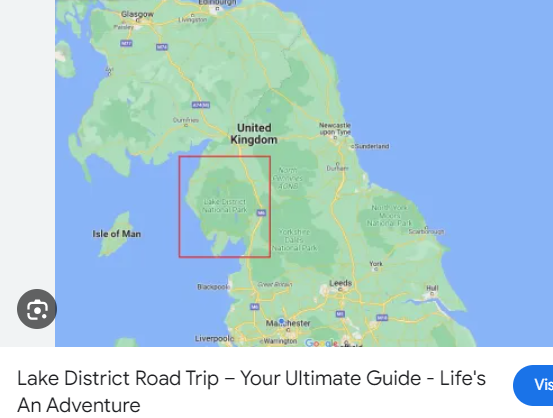
| England's latest national park covering 912 square miles
|
| Ski centres in Scotland | |
| St Andrew in Scotland | home of golf |
| Edinburgh Castle | looks after by Historic Environment Scotland, a Scottish goverment agency |
| Garden in England | Kew Gardens, Sissinghurst, Hidcote |
| Garden in Scotland | Crathes Castle Inverary Castle |
| Garden in Wales | Bodnant Garden |
| Snowdonia National Park | Located in North Wales -the highest mountain in Wales |
| Swansea | Wales |
| Garden in Northen Ireland | Mount Stewart |
| World Heritage Site | Stonehenge (Wiltshire) The forts of Housesteads and Vindolanda The Houses of Parliments (false: London Eye) |
| The National Museum | Cardiff, Wales most well known gallery in Wales |
| National Gallery | Edinburgh, Scotland |
| Giants Causeway 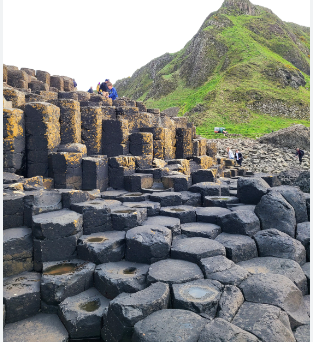
| -formed 50million years ago -located the north-east coast of Northern Ireland -land formation consisting of columns made of volcanic lava |
| National Horseracing Museum | Newmarket, Suffolk |
| Great Western Railway | first major railway built |
| Big Ben | -great bell of the clock at the House of Parliament in London -150 years old |
| Loch Lomond 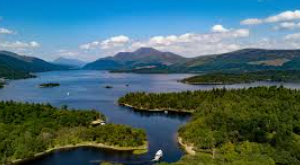
| -largest expanse of fresh water in mainland Britain and probably the best-konwn part of park |
| The London Eye | on the southern bank of River Thames 443 feet tall (135 metres) |
| Theatreland
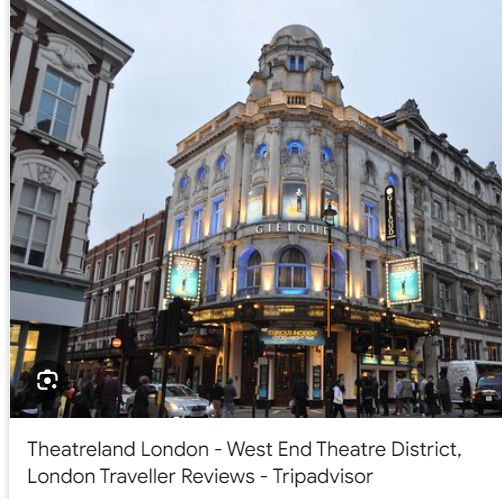
| London west end -name of the area in London where famous theatres are located |
| Crystal Palace, Hyde Park 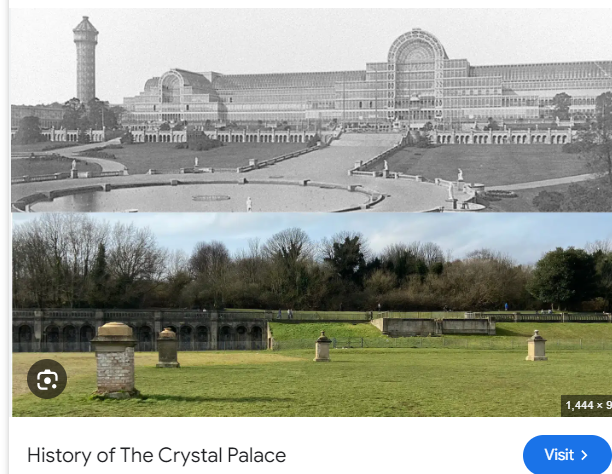
| palace was a cast-iron and plate-glass -huge building made of steel and glass exhibits ranged from huge machines to handmade goods. -building originally erected in Hyde Park, London, England, to house the Great Exhibition of 1851 |
| The Tate Britain Tate Modern
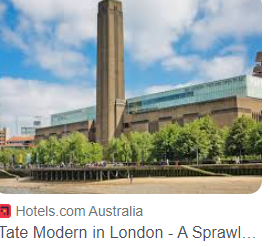
| Located in London |
Visitors
Tower of Londons
tours to tower of london ar given by Yeoman Wardens (also known as Beefeaters), who tell visitors about the building’s history
The White Tower in the Tower of London (Normal castle) built : William the Conqueror
where Crown Jewels kept
Anne Boleyn, the wife of Henry VII, was executed (accused of taking lovers, unpopular in coutnry)
Scottish Exhibition and Conference Centre (SEC) | Glasgow |
|
|
|
|
Assembly building
Welsh | SMs (Senedd Member) -60 members -elected every 4 years, a form of proportional representation | Senedd in Cardiff Bay |
scottish | MSPS/ Scottish Parliaments - 129 members -elected proportional representation | Holyrood in Edinburgh -can legislate on civil and criminal law, health, education, planning and additional tax-rising power (x immigration, security, defence) |
Northern Ireland | MLS (members of Legislative Assembly)
90 elected members
-elected proportional representation | -has been suspended for few occasions. (false: never been suspended) -can made deicsion: education, agriculture, environment health and social service -cannot decided on immigrations and defence issue |
Capital city
|
| Population is unequally distributed |
Scotland | Edinburgh | 8% |
Northern Ireland | Belfast | less than 3% |
Wales | Cardiff | 5% |
UK | London | England- 84% |
UK population: ethically diverse and changing rapdily, especially in large cities (true).
Most people lives in town and cities but much of Britain is still countryside.
Flower
England | Rose |
|
Northern Ireland | Shamrock | 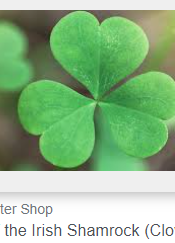
|
Scotland | Thistle | 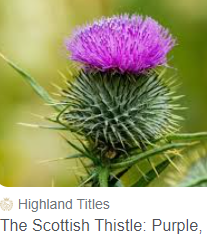
|
Wales | Daffodil | 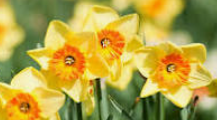
|
Traditional English food - Roast Beef (served with potatoes, vegetables, Yorkshire puddings)
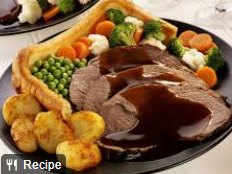
Traditional Scottish food - Haggis (sheep’s stomach stuffed with Offal, suet, onions and oatmeal)
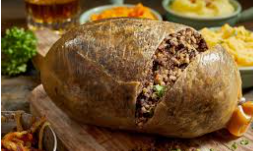
Traditional food Northon Ireland - Ulster fry (fired meal with bacon, eggs, sausage, black pudding, tomatoes, mushrooms, soda bread and potato bread).
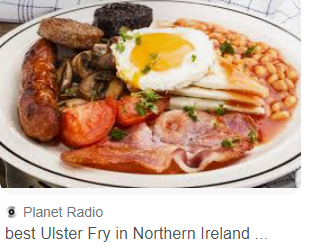
Welsh cakes made of flour, dried fruits ad spices
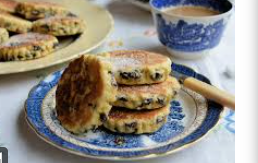
Sailor
Admiral Nelson
ship - HMS Victory, can be visited in Portsmouth
Battle of Trafalgar
British fleet at Trafalgar
British Officer in charge of the British Fleet at the Battle of Trafalgar against the Spanish fleet
| Cowes, in the Isle of Wight | most famous sailing event in UK takes places |
1966/67 | Sir Francis Chichester | -first person to sail singlehanded around the world |
2 years later | Sir Robin Knox-Johnston | -first person to do without stopping |
2004 | Dame Ellen MacArthur | yachtswomen. she was the fastest person to have sailed around the world single handed |
| 2 universities participate rowing race annually, takes place on River Thames | University of Oxford Unviersity of Cambridge |
| Watersport popular in UK | Rowing, Sailing |
Famous/ noble person/Poeam
Music
Henry Purcell- organist at westminster abbey-
George frederick handel- german- wrote water music for king george 1 & music for royal fireworks for george II, oratorio- messiah-choire at easter time
Gustav holst- the planets, jupiter
Sir Edward Elgar- born in worcester- the Pomp & circumstance marches- play at last night of proms at royal albert hall
Ralph Vaughan Williams- music for orchestras & choirs- traditional english folk music
Sir William Wlton- marches for coronation of George VI & QE II, Facade-ballet, Belshazzar’s Feast
Benjamin Britten- peter grimes, Billy Budd, ayoung person’s guide to orchestra, founded Aldeburgh festival in Suffolk- international event
1960- The beatles & rolling stones- pop music
Late 1970- 1990- punk movement
Wembley stadium, O2 in greenwich, SEC centre in glasgow
Festivals- glastonbury, isle of wight, creamfields
National eisteddfod of wales- annual cultural festivals
Mercury music prize in september for best album
Brit award- for group & solo artist
Films
1st film publicly in Uk in 1896
Studio flourish in 1930
Sir Alexander Kora, Alfred Hitchcok- left for Hollywood
British Comedies- Passport to Pimlico, The ladykillers, Carry on Films- 1950, 1960
Nick Park- won 4 oscars for animated films- wallace & Gromit
Sir Lawrance Oliver, David Niven, Sir Rex Harrison, Richard Burton
Oscars actor- Colin Firth, Sir Anthony Hopkins, Dame Judi Dench, Kate Winslet, Tilda Swinton
Alfred Hitchcock- The 39 steps
David Leans- Brief encounter, Lawrence of arabia
Carol Reed- The third man
Frank Lunder- The belles of St Trinian’s
Ken Russel- Women in Love
Nicolas Roeg- don’t look now
Hugh Hudson- Chariots of fire
Rolan Joffe- The killing fields
Mike Newell- four weddings and funeral
Kevein Macdonald- Touching the void
Comedy
1st published in 1940- Punch
That was the week that was- 1960
Spitting image- 1980, 1990
Monty Python’s flying circus- 1969
Opera- coronation street, eastenders
Theatre
Theatreland- london’s west end
The mousetrap- by Dame Agatha Chritie in west end since 1952
Gilbert & sullivan wrote comic operas- HMS Pinafore, the pirates of penzance, mikado
Andrew Lloyd webber- music show- collaboration with Tim Rice, Jesus christ superstar, evita & cats, phantom of opera
Laurence oliver award in london- in shakespare
Poetry
Anglo-Saxon poem Beowulf- hero again monsters
Middle ages poem- Caucer’s canterbury tales, Sir Gawain, Green Knight-knights at the court of king arthur
John Milton wrote Paradise lost- inspired by religious view
William wordsworth was inspired by nature (The daffodils)
Sir Walter Scott was inspired by scotland
Wilfred Owen (Anthem for Doomed Youth) & Siegfried Sassoon were inspired by 1st WW experience
19th century poets- William Blake (The Tyger), John Keats, Lord Byron (She walks in Beauty), Percy Shelley, Alfred Lord Tennyson, Robert Browning (Home Thoughts from abroad) & Elizabeth Browning
Recently popular poets- Sir Walter de la Mare, John Masefield, Sir John Betjeman, Ted Hughes
Literature
Novelist Sir William Golding, poet Seamus Heaney, Playwright Harold Pinter- nobel prize in literature
Agatha Christie’s detective stories are read all over the world
Ian Fleming’s books by James Bond
2003- Lord of rings by JRR Tolien- country’s best loved novel
Man booker prize for fiction award since 1968- past winners- Ian McEwan, Hilary Mantel, Julian Barnes
Jane Austen- Pride & prejudice, Sense & sensibility-marriage & family relationship
Charles dickens- Oliver Twist & great expectations, Scrooge (mean person), Micawber (always hopeful)
Robert Louis Stevenson- Treasure island, Kidnapped & Dr Jekyll & Mr Hyde
Thomas Hardy- rural society- Far from the madding crowd, Jude the obscure
Sir Arthur Conan Doyle- scottish doctor- sherlock holmes
Evelyn waugh- satirical novels- Decline & fall & scoop- known for brideshead revisited
Sir Kingsley Amis- Lucky Jim
Graham Greene- religious belief- The heart of the matter, honorary consul, brighton rock, our man in Havana
J K Rowling- Harry Potter
Fashion & design
Thomas chippendale- furniture in 18th century
Clarice Cliff- art deco ceramic
Sir Terence Conran- interior designer
Mary Quant, Alexander McQueen & Vivienne Westwood- fashion
Architecture
Hardwick Hall in Derbyshire
17th century- classic architecture
Inigo Jones- design Queen’s house at Greenwich & Banqueting house in Whitehall in London
Sir Christopher Wren- ornate style- St Paul Cathedral
18th century-simple deisgn
Robert Adam- dumfries house in scotland, Royal crescent in bath
Lancelot ‘ capability’ brown- ground around country houses
Gertrude Jekyll work with Edwin Lutyens- colourful gardens around houses- chelsea flower show garden design
19th century- Gothic style
House of parliament & St Pancras station, town halls in manchester & sheffield
20th century
Sir Edwin Lutyens- new delhi in india, war memorials- cenotaph in whitehall
Sir Norman Foster, Lord Rogers, Dame Zaha Hadid
Art
16-17th century- Hans Holbein, Sir Anthony Van Dyck- abroad
18th century- british artists
National gallery, tate britain, tate modern in london, national museum in cardiff, scottish national gallery in edinburgh
Thomas Gainsborough- portrait painter in country or garden scenery
David Allan- scottish portrait painter- origin of painting
Joseph Turner- landscape painter
Johan constable- landscape painter- Dedham Vale on suffolk- essex border
Pre-raphaelites-2nd half of 19th century- picture on religious theme in bright color- Homan Hunt, Dante Gabriel Rossetti, Sir John Millais
Sir John Lavery- Northern irish portrait painter- pain royal family
Henry Moore- english sculptor- large bronze abstract sculptures
Hohn Petts- Welsh artist- engraving and stained glass
Lucian Freud- german born british artist- portrait
David Hockney- pop art 1960
Turner prize-1984- 4 works- Damien Hirst, Richard Wright
Sports
Sir Roger Bannister- 1st man in world to run a mile in <4 min in 1954
Sir Jackie Steward- scottish racing driver-won formula 1 championship x3 times
Bobby moore- world cup in 1966- football team captain
Sir Ian Botham- captain cricket team
Jayne Torvill & christopher Dean- gold medal in ice dancing in olympic 1984
Sir Steve Redgrave- rowing x5 olympic game- gold medal
Dame kelly homes- 2 gold medal for running 2004 olympic games
Dame ellen macarthur- yachtswoman, 2004 fastest person to sail single handed
Sir Christ Hoy- scottish cyclist- 6 gold olympic medal, 11 world championship
Baroness ranni grey thompson- wheelchair, 16 paralympic medal 11 gold medals
David Weir-paralympian wheelchair- 6 gold medal over 2 game, 6x london marathon
Ellie Simmonds-paralympian- youngest
Sir Bradley Wiggins- cyclist- 1st briton to win tour de france, 8x olympic medal- gold in 2004, 2008, 2012, 2016
Sir Mo farah- british distance runner, gold medal in 2012, 2016
Dame Jessica Ennish-Hills- 2012 olympic gold medal in haptathol, silver medal in 2016
Sir Andy Murray- scottish tennis -US open- won men’s single- grand slam
Beowulf | -Anglo-Saxon poem, tells of its hero’s battles against monsters and is still translated into modern English |
Geoffrey Chaucer | -a collection of travelling poems - The Canterbury Tales - a group of people going to Canterbury on a pilgrimage |
William Shakespeare | Born in Stratford-upon-Avon England Elizabeth period (richness of its poetry and drama) most famous plays - A Midsummer Night’s Dream
The darling buds of May – lines from poems still often still quoted. from the play Sonet all the world a stage - lines from ‘ As you like it’ A rose of by any other name belongs to play Romeo and Juliet line ‘to be or not to be’ : line from play Hamlet British playwrights, great influence on the English language and invented many words that still common today most famous plays include MacBeth
|
Sir Arthur Conan Doyle | |
William Wordsworth | |
Sir Walter Scott | |
Evelyn Waugh
| |
British poets of the 19th century | |
Robert Burn | Scottish Poet - The Bard from Scotland Auld Lang syne song
|
JRR Tolkien | |
Gilbert and Sullivian | in 19th century, Gilbert and Sullivian wrote comic operas, often making fun of popular culture and politics. Include HMS Pinafore, The Pirate of Penzance and the Mikado
|
The Mousetrap | |
George Frederick Handel | |
|
|
SIr Charles/ Charlie Chaplin 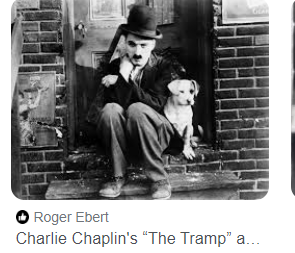
| famous silent movies for his tramp character and was one of many British actors to make career in Hollywood
|
British actors won Oscars | Colin Firth Sir Antony Hopkins Dame Judi Dench Kate Winslet Tilda Swinton
annual British Academy Film Awards, hosted by BAFA), are British equivalents of Oscars. |
Harry Potter James Bond | film produced in UK -most commercially successful of all time and one of the highest-grossing film franchises |
David Lean | |
Alfred Hitchcock | |
Andrew Lloyd Webber and Tim Rice | - wrote music for the popular show Jesus Christ Superstar - and Evita, Cats, The Phantom of the Opera |
Andrew Lloyd Webber and Tim Rice
| - wrote music for the popular show Jesus Christ Superstar - and Evita, Cats, The Phantom of the Opera |
David Hockney | |
Mike Newell | |
Nick Park | animated films won four Oscars for his animated films, including Wallaca and Gromit |
Music
Sir Edward Elgar | famous as musician 1857-1934 work - Pomp and Circumstance Marches, March No1 (Land of Hope and Glory) usually played at the Last Night of the Proms at Royal Albert Hall, London |
Boudicca | one of tribal leaders who flights against Romans the queen of Iceni in what is now eastern England |
Oliver Cromwell (lord protector) | leader of English republic given the title of Lord Protector and rules until his death in 1658 defeated Charles II during civil war, escape Worcester and hid in an oak tree before escaping to Europe
|
Emmeline Pankhurst | 1858: bon in Manchester 1889: set up women ‘Franchise League’ in 1903 : Women’s Social and Politician Union (WSPU) leader of suffragettes, the group that campaigned for women’s right to vote
|
James Cook | Captain James Cook mapped the coast of Australia and a few colonies were established there |
Designer
Clarice Cliff | Art Deco Ceramic |
Thomas Chippendale | furniture (18th century) |
Sir Terence Conran | interior design in 20th century |
SPORTS
Bobby Moore | captained the English football team that won the World Cup in 1966 |
Baroness Tanni Grey- Thompson | won 16 paralympic medals, including 11 gold medals, in races over five paralympic games. won London Marathon six times broke a total of 30 world records
|
Mary Peters | Born in Manchester, moved to Northen Ireland as a child won Olympic Games gold medal in pentathlon in 1972 |
Ellie Simmonds | Paralympian who won golds for swimming at 2008, 2012,2016 the youngest member of British team at 2008 Gams |
British Paralympians | |
Mo Farah | first Briton to win Olympic gold medal in 10,000 metres |
Sir Roger Bannister | first man in the world who run a mile in under four minutes, in 1954
|
Sir Jackie Stewart
Lewis Hamilton, Jenson Button, Damon Hill
Sir Ian Botham
Dame Kellly Holmes
Jessica Ennis
Jayne Torvil and Christopher Dean
Sir Steve Redgrave
Florence Nightingale | 1853-56 | -development of nursing in UK -founder of modern nursing - a nurse who world in military hospitals, treating soldiers who fighting the Crimean War (Britain, turkey & France fight against Russia) |
Alexander Fleming | 1928 | discovered penicillin |
John MacLeod (1876-1935) |
| Scottish physician discoverer of insulin, used to treat diabetes |
Sir Robert Edwards Patrick Steptoe |
| IVF therapy pioneered the world's first test tube baby was born in Oldham, Lancashire in 1978 |
Francis Crick |
| Discovered the structure of DNA molecules |
Science discoveries
| Francis Crick | Discovered the structure of DNA molecules |
| Issac Newton | discovery of gravity philosophiae Naturalis Principia Mathematics (mathematics principle of natural philosophy) |
18th and 19th centuries | James Watt
| steam power -helped the progress of the Industrial Revolution -Britain was first country to industrialize on a large scale |
| William Caxton | the first person in England to print books using a printing press |
1920 | Scottish John Logie Baird | developed television |
| Sir Robert Watson- Watt | developed radar |
1930 | Alan Turing (mathetician) | Turing machine -theoretical mathematical device |
| Ernest Rutherford (work in Manchester, then Cambridge University) | -split the atom in Manhattan Project in the United State, which developed the atomic bomb |
| Sir Christopher Cockerell | invented Hovercraft |
1930 | Sir Frank Whittle | Jet engine |
1932 | Scotsman John Logie Baird | first television broadcast between London and Glasgow |
1960 | James Goodfellow | ATM use in Barclay Bank in Enfield North London at 1967 |
25 December 1990 | Sir Tim Berners Lee | inventor of the World Wide Web |
Isambard Kingdom Brunei | Construction of the Great Western Railway original from Portsmouth -an engineer who built tunnels, bridges, railway lines, and ships. e.g. Paddington station in London (southwest of England), west midlands, and Wales. |
Famous Innovation/Creation
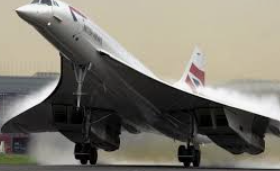
Concorde aircraft
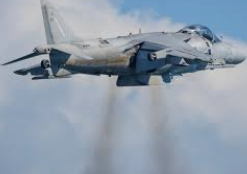
Harrier Jump set
Industries
before the 18th century, agriculture was the biggest source of employment in British.
European Economic Community (EEC)
West Germany, France, Belgium, Italy, Luxembourg and Netherlands first formed in 1957
at first the UK no join, but eventually did in 1973
Politic/ Prime Minster
17th century, 2 main groups in Parliament : The Whigs and The Tories
In May 2010, first time in UK since February 1974 - no political party won on overall majority in the General Election. The Conservative and Liberal Democrats parties formed coalition and the leader of the Conservative Party, David Cameron, became Prime Minster.
Winston Churchill
1721 to 1742 | Sir Robert Walpole | the first man to be called Prime Minister |
1923 | Richard Austen Butler | conservative MP in 1923 oversaw the introduction of the Education Act 1944/ The Butler Act - free secondary education in England and Wales |
1945-1951 | Clement Attlee | PM led Labour Party for 20 years |
1979-1990 | Margaret thatcher | was the first women Prime Minster of the UK Longest serving Prime Minster |
| John Major | northern ireland peace process |
1997 | Tony Blair | leader of labour party & introduce scottish parliament & welsh assembly |
2007 | Gordon Brown | PM |
2010 | David Cameron | The Conservative and Liberal Dmocrat parties formed coalition and the leader of the Conservative Party, David Cameron, became Prime Minster. |
| 10 Downing Street | official home of Prime Minster |
| Chequers | country house outside of London of PM |
| Prime Minster’s Question | takes place every week while Parliament is sitting |
| Life peers | Appointed by the monarch on the advice on the Prime Minster |
| Home Secretary | responsible for crime, policing, immigration (CIP) |
| Devolved administrations | control / pass laws on health education |
| Central UK government control | policy and laws governing -defense, -foreign affairs -immigration -taxation -social security |
| Local authorities | Towns, cities, and rural areas in the UK are governed by democratically elected councils, often called ‘local authorities’ (false: governed by government-appointed officials) |
| William Wilberforce | a politician -an evangelical Christian and a member of Parliament, also played an important part changing in law. -turning public opinion against the slave trade -abolition of slavery |
Court
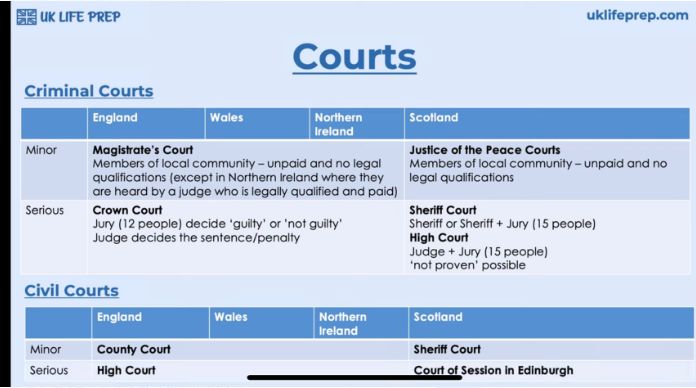
Crown court | most serious cases of children aged 10 to 17 in England, Wales and Northen Ireland |
County court | deal with cases involving personal injury, family matters, breaches, and divorce in England and Wales
Scotland: Sherrif Court |
Magistrates’ court | deal with minor criminal cases in England, Wales, and Northen Ireland
Scotland: Justice of the Peace Court |
|
|
Youth Court | Members of public are not allowed in Youth Court. and the name or photographs of the accused young person cannot be published in newspapers or used by media |
Youth Court in England,Wales and NI | normally heard by accused person aged 10 to 17 |
Individual Registration | -used in Northen Ireland (x Scotland, x Wales) -all those entitled to vote must complete their own registration form |
Small claims procedure | an informal way of helping people to settle minor disputes without spending a lot of time and money using a lawyer |
Small claims | 10,000 pounds - England and Wales |
Small claims | 3, 000 pounds - Scotland and Northern Ireland |
12 - Jury | In England, Wales and Northern Ireland a jury has 12 members |
15- Jury Scotland | In Scotland, a jury has 15 members. |
Serve the Jury | anyone who is on the electoral register and is age 18 to 70 can be asked to serve on a jury selected - randomly from the electoral register
|
Law
| Act of the Government of Wales | during the reign of Henry VIII -wales became united with England |
1707 | Act of Union | -known as the Treaty of Union of Scotland, creating the Kingdom of Great Britain |
1833 | Emancipation Act | Abolished slavery throughout the British Empire |
1847 | Factories Act of 1847 | Limited the number of hours that women and children could work to 10hours per day. |
1944 | the Butler Act | Free secondary education in England and Wales (PM: Richard Austen Butler) |
1960 | Law of abortion Law of divorce | Social laws were liberalized during 1960s |
1679 | Habeas Corpus Act | -an important piece of legislation that remains relevant today - is Latin in ‘you must present the person in court’ -act guaranteed that no one could be held prisoner unlawfully -every prisoner has a right to the court hearing |
| Criminal Offences | Racial Crime Smoking in public Female genital mutilation (FGM) or taking a girl or women abroad for FGM is illegal in UK and it is crimal offence (True) |
| Civil Law | Discrimination in the workplace |
| Rape | if a husband forces his wife to have sex he can be charged with rape (true). |
| 1000 fine | if you watch TV but dont have TV licence
People who are blinded- get 50%discount for TV licensed
People over 75- can apply for free TV licence |
| 50 pounds | highest note value in UK |
| 2 pounds | coin with the highest value in UK |
| a pound | 100 pence |
| UK coin | 1p, 5p, 1pounds (x 25p) |
| Northern Ireland Scotland | have own banknotes valid everywhere in UK however, shops and businesses do not have to accept them |
| Contact your local police force | if you thinking someone trying to persuade you to join an extremist or terrorist cause |
| Dog | in public place -wears a collar showing the name and address of owner |
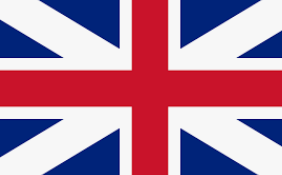
Union Flag/ Union Jack
St George | England | Red cross on the white ground 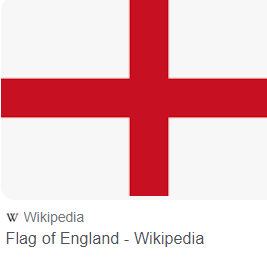
| 23rd April |
St Andrew | Scotland | Diagonal white on blue ground 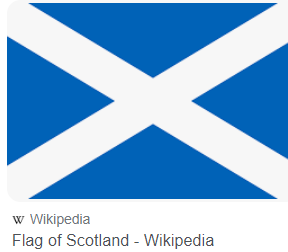
| 30th November |
St Patrick | Ireland/ Northern Ireland | Diagonal red cross on white ground
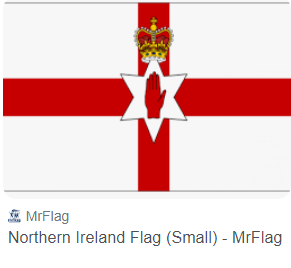
| 17th March |
St David | Wales |
| 1st March |
Celebration/Day
14th February | Valentine’s Day |
|
17th March | St Patrick Day | patron of Northern Ireland |
| Patron Saints’ day | Only Scotland and Northern Ireland have their own patron saint’s day an official holiday |
23rd April | St George Day | Patron of England |
| Mothering Sunday/ Mother’s day | -three weeks before Easter -children offer their moms greeting cards and presents |
March/ April | Easter | Jesus Christ rising from the dead on Easter Sunday. |
|
|
|
| Good Friday | The day when Jesus Christ died, during Easter |
| Lent | 40 days before Easter
Begin on Ash Wednesday
2 names given before Lent Shrove Tuesday Pancake Day
|
1st April | April Fool Day | is a day when people play jokes on each other until midday. -television and newspaper often have stories that are April fool jokes |
September | Mercury Music Prize awarded | for the best album from UK and Ireland |
31st October | Halloween | -play trick and treat is an ancient festival and has roots in the pagan festival to mark the beginning of winter |
30th November | St Andrew day | patron of Scotland |
October / November | Diwali | -celebrate by Hindu and Sikh - last for 5 days - often called the Festival of Lights - the victory of god over evil and the gaining of knowledge - famous celebration in Leicester |
November/ December | Hanukkah | -celebrated for 8 days - on each day the festival a candle is lit on a stand of 8 candles (called menorah)to remember the story of the festival, where oil that should have lasted only a day did so far for 8 -remembers the Jews's struggle for religious freedom |
24th December | Christmas Eve |
|
25th December | Christmas Day | celebrates the birth of Jesus Christ |
26th December | Boxing day | the day after Christmas Day |
| Bank holiday in Scotland | 1st of January 2nd of January
|
| Bank holidays | public holiday a day when banks are closed |
| Bank holiday | bank holidays of no religious significance are celebrated at the beginning of May, late May or early June, and in August - True |
31st of December | New year’s eve |
|
31st December | Hogmanay | equivalents to New year’s eve in Scotland |
| Vaisakhi (spelled Baisakhi) | Sikh festival , community: Khalsa
|
Religion (2011 consensus)
Christian - 59%
no religion - 25%
Muslim - 4.8%/ 4%
Hindu - 1.5%
Sikkh - 0.8%
Jewish, Buddhist <0.5%
Events
| Golf | Open Championship |
| Hoarse racing | Grand National/ Royal Ascot |
| Cricket | The Ashes |
19th century | Rugby | Six Nations championship |
| Tennis | Wimbledon Championships |
Laurance Olivier Awards | take place annually at different venues in London |
Man Booker Prize for Fiction (Literature) | since 1968, awarded annually for best fiction novel written by an author from Commonwealth, Ireland or Zimbabwe winners include - Ian McEwan, Hilary Mantel and Julian Barnes |
The Brit Awards | name of annual events that gives awards in a range of musical categories, such as best British group and best British solo artist |
The Grand National Royal Ascot | Famous horse racing events in UK |
Royal Ascot | the 5 days race meeting is attended by the Royal Family takes place in Berkshire Liverpool - Grand National Aintree Scottish - Grand National at Ayr
|
Horse racing | long association with royalty |
Scottish Grand National Hoarse racing event | celebrated in Ayr |
The Ashes 
| most famous cricket competition which is a series of Test matches played between England and Australia |
The Fringe | -a showcase of mainly theater and comedy performances. e.g. Edinburgh Festival Fringe, Scotland -every summer -series of different arts and cultural festivals, with biggest and most well known being Edinburgh Festival Fringe |
The Proms | famous classical music event in UK |
The National Eisteddfod of Wales | annual culture festival which included music, dance, art and original performances largely in Welsh -include a number of important competitions for Welsh poetry |
The Turner Prize | established in 1984 contemporary art award recognized as the most prestigious visual art award in Europe |
Formula1 Grand Prix Event | held in UK every 1 year |
Olympic games | held in UK for 3 times 1908, 1949, 2012 (Stratford, East England) |
Six National Championship | most famous rugby union competition between England, Ireland, Scotland, Wales, France and Italy. X germany |
The Open Championship | the only ‘Major’ tournament held outside United States. It is hosted by a different golf course every year. |
The Wimbledon Championships | is the oldest tennis tournament in the world and the only ‘Grand Slam’ event played on grass -most famous tournament hosted in Britain, which takes place each year at the All England Lawn Tennis and Croquet Club |
Edinburgh Festival | takes place in Edinburg, Scotland every summer |
Eid a- Fitr | end of Ramadan, when Muslin have fasted for a month -the day where Muslims thank Allah for giving them the strength complete the fast |
Eid ul Adha | reminds Muslims of their own commitment to Gods |
The Proms | eight-week summer season orchestral classical music takes place in various venues, including Royal Albert Hall in London organised by British Broadcasing Corporating (BBC) |
Age
Drive a moped- at least 16 years old
Drive a car/ motorcycle- at least 17 years old
National Lottery/ lottery ticket/ scratch card/ buy alcohol - 18 years old
but people under 18 may be allowed in some pubs with an adult
if 16, people can drink wine or beer with a meal in hotel/ restaurant (including eating area in pubs) as long as they are with someone over 18
Pubs open during the day from 11am (12noon on Sundays)
Stand for public office - 18 years old
Most citizens of UK, Ireland or the commonwealth aged 18 or over exceptions, including members of the armed forces, civil servants, people found guilty of certain criminal offenses
Association/ Programmes
The National Trust | 1895 works for the preservation of important buildings, coastline and countryside in UK -there are more than 61,000 volunteers |
Environment charities | The national trust, Friends of the Earth |
Commonwealth | -has no power over its member - can suspend membership |
Commonwealth | -most member states are once part of British Empire, although a few countries which were not have also joined. an association of countries that support each other and work together towards shared goals in deomocracy and development. |
The National Citizen Service program | is optional. -gives 16- to 17-year-olds the opportunity to enjoy outdoor activities, develop their skills and take part in community project.
compulsory (false) |

Comments
Post a Comment